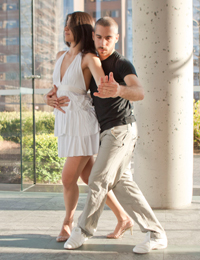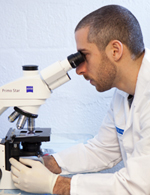

Shall We Dance?
Einstein Postdoc Brings Samba to Morris Park Avenue
By day you’ll find Rodrigo Ducati working in the lab of Dr. Vern Schramm conducting research on malaria. By night, however, you might find the postdoctoral fellow on a dance floor. Earlier this year, he and his wife, Tathyana Franco, began leading samba classes as part of the Einstein Dance Club.

Rodrigo and Tathyana demonstrate the samba "I started taking dancing classes in 2005, when we lived in Brazil," he said, "I began with Cuban salsa, but later on shifted to samba."
It was during this period that he and Ms. Franco got to know each other better. She recalled, "I was in college and I never had time to do anything fun because I always had to study at night. Rodrigo was my lab mate in Brazil, but we were just friends. He knew that I liked to dance, so he invited me to a class."
They clicked and wed in 2011, moving to the U.S. in September. Dr. Ducati works with the enzyme Hypoxanthine-guanine-xanthine phosphoribosyltransferase (HGXPRT ). "My goal is to determine the transition state for the enzyme-catalyzed reaction, which may prove useful in developing new inhibitors against malaria," he explained.
Ms. Franco has a volunteer position in the Blanchard lab, where she works on a project aimed at fighting tuberculosis.

Dr. Ducati getting a close look "When we got settled, one of the fun things we heard about was the Dance Club," said Dr. Ducati.
The Einstein Dance Club has been around since 2006. "We founded it as the Einstein Ballroom Dance Club, but changed the name to reflect the broader range of dance offerings," noted Dr. Joerg Schlatterer, who is an instructor of biochemistry and an administrative fellow in the graduate division. "We have ballroom dances, tango, tap-dance, hip-hop, salsa, merengue and now, the wonderful samba class."
"When we joined the club," noted Dr. Ducati, "one of the things we missed was samba, so we decided to start teaching. That’s a way we can pass on what we know, but also have an appointment, me and my wife, to practice."
The couple hopes that more men will visit the class, which takes place at 6:30 on Monday evenings in the Falk Recreation Center. "We would be interested in having more men, but one of the reasons we don’t is that people have a misconception about what samba is," said Dr. Ducati.

Ms. Franco working at the bench He continued, "If you ask anyone what samba is, they will say it’s a naked girl with feathers dancing alone. But that’s something you will see only during Carnaval. Our samba is different: It’s ballroom style, a man and a woman dancing together, as a couple."
Ms. Franco added with a laugh, "My lab mates say, ‘I don’t like your samba, I like the naked women.’" She pointed out another surprise for those who take the class: "We don’t dance to just Brazilian music, we also use popular music from here."
The two dance enthusiasts agree that the pastime offers other benefits. "I used to be a really shy guy. Dancing offers a way of getting closer to people. You have a group of people who are enjoying what you’re doing and you make friends."
Dr. Schlatterer echoed, "It’s a way to network and connect, not on a science level, but on a personal level. Of course, dancing also is fantastic exercise, especially samba."
Dancing also offers a form of stress-relief. Dr. Ducati noted "We all have pressures at work. Doing samba is a way to enter a different world."
Posted on: Friday, April 6, 2012

Tablet Blog